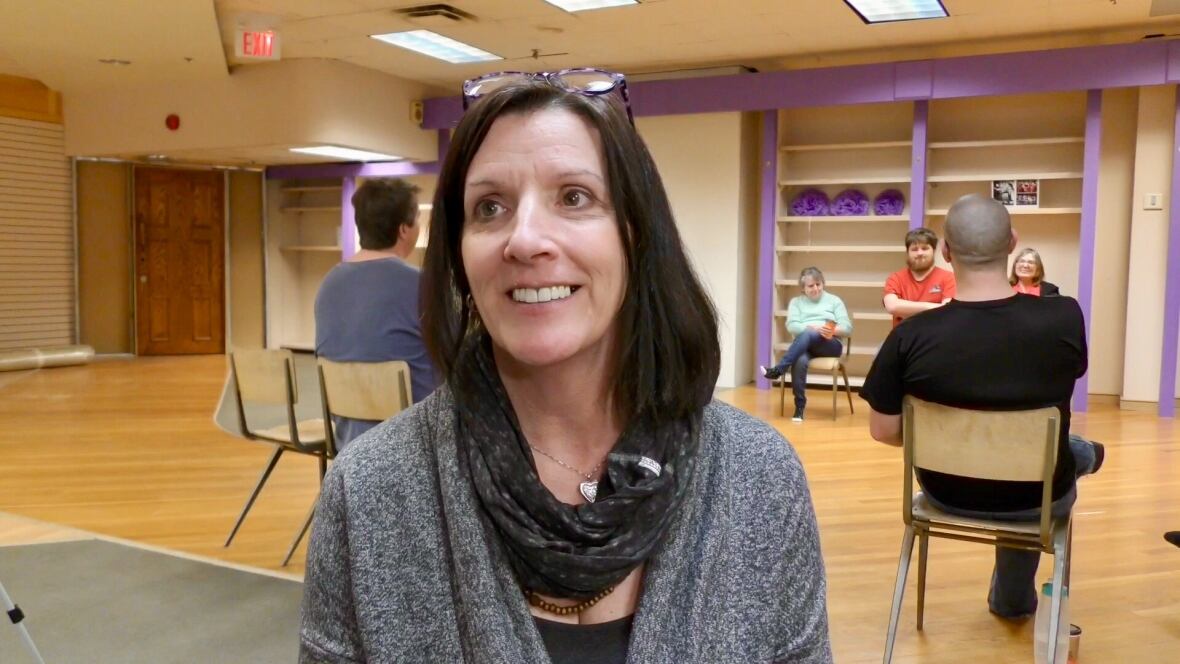Laughter truly the best medicine for mental health improv group
Group hopes funding will continue for program

The doctor's advice to Stephanie Douglas was pretty straightforward: get out more.
So she did, and it led her to a comedy group in Charlottetown that has helped improve her mental health.
"It had been two years since I had come downtown on my own," said Douglas, who has post traumatic stress disorder and chronic arthritic pain.
"My doctor told me to either find a volunteer job, or one thing in the community that brought me joy."

As if on cue shortly afterwards, a friend told Douglas about the Mental Health Comedy Group downtown. She's been coming ever since.
There's a lot of life that's very heavy, and having the lighthearted approach, it's very helpful.— Dave Hicks
"Getting over the panic attacks and anxiety and coming down and meeting some really interesting and funny and intelligent people and laughing, makes my whole body feel better," Douglas said.
There have been other benefits to joining the improv group — Douglas is using less pain medication and the physical workout helps her arthritic joints.
The Island Media Arts Cooperative, with money from Canada Council and Skills PEI, established the new temporary peer program to support the creative expression of people living with mental illness and addictions.

Over the last few months, program developer Dave Hicks has spent time working with different groups to develop skills in everything from filmmaking to stand-up comedy.
Hicks himself has been diagnosed with Schizoaffective disorder, and said running the improv group has helped him.
"There's a lot of life that's very heavy, and having the lighthearted approach, it's very helpful," Hicks said.
"If someone is broke and in a group situation and they're funny, all of a sudden their status in that group is raised," he said. "And that's really what I want to do is raise the status of people in our community. It's a tool for recovery."

Darlene Lund of Charlottetown, another of the participants, looks forward to it every week.
"I know when I wake up on Tuesday and Thursday mornings, for sure there's a smile on my face. It's a commitment, yet I just feel like it's something I wouldn't miss despite snowstorms or anything at all."
Douglas is worried what happens when the funding ends in the next few months. She's hoping the province will step in.

"If I can't find something similar, that I can afford, then my fear is that I'll start retreating again because I don't have that something to go to that's joyful," Douglas said. "If you feel better, you start to take care of yourself better."
Hicks said the program is worth keeping.
"I've seen people's personalities blossom, their confidence has gone up," he said.
"Having tragedies in their lives, it's just been a way for us to lean on each other."

Lund said she's often had to lean on the other players.
"Lately, I've just been having a few sad days and I can come here and I can just say, 'I'm just sad today,' but by the time we get playing our games and interacting, I'm smiling and laughing."
The Mental Health Comedy Group will hit the stage again Saturday afternoon at the Murphy Centre.
- MORE P.E.I. NEWS: | Islanders keep close eye on Jamaica situation
- MORE P.E.I. NEWS: | 'COPD school' expands to help keep patients with debilitating lung disease out of hospital

